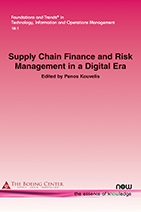Fishing for Value (Anchovies Are Not Just for Pizza)
By Matthew J. Sobel, Weatherhead School of Management, Case Western Reserve University, USA, matthew.sobel@case.edu
Abstract
Profit optimization is the default criterion in recent literature on the selection of fishery catch sizes. This work contrasts the operational effects of that criterion with those of the optimization of shareholder value. The latter criterion is the valuation of the sequence of monetary payouts received by the owner of the assets used in fishing. The results in the monograph are driven by the need for working capital to bridge the delay between payment of operating costs and receipt of revenue at a later time. The assumptions are reasonably consistent with the Peruvian anchoveta fishery (the world’s largest) and have the following implications: if the interest rate on short-term loans is not too high, then working capital should be funded entirely with short-term loans; it is easy to adapt profit-driven practices and research to optimize value; and, although value-optimal escapements generally differ from profit-optimal escapements, they are the same if exogenous uncertainty does not affect the prices or unit costs of catches. Also, the work briefly considers these issues for a fishery (unlike Peruvian anchovetas) that can separately select the size of each age or size class.
Supply Chain Finance and Risk Management in a Digital Era
This special issue, which surveys the most recent research in integrated risk management for supply chains, is motivated by the success of the 8th “Supply Chain Finance and Risk Management Workshop,” which was held at the Olin Business School of Washington University in St. Louis on May 30 and May 31, 2023. The Editors wanted timelier access to the latest research on supply chain finance and supply chain risk management. It is well-known, that due to review process lead times, articles published in traditional journals can take 2 to 3 years. The idea of producing an edited volume, which would include the latest articles on the topics above appealed not only to the workshop participants but also to other active members of the iFORM (Interface of Finance, Operations, and Risk Management) research community. Foundations and Trends in Technology, Information and Operations Management provides an ideal outlet for such a volume.

Companion
Foundations and Trends® in Technology, Information and Operations Management, Volume 18, Issue 1 Special Issue: Supply Chain Finance and Risk Management in a Digital Era
See the other articles that are also part of this special issue.